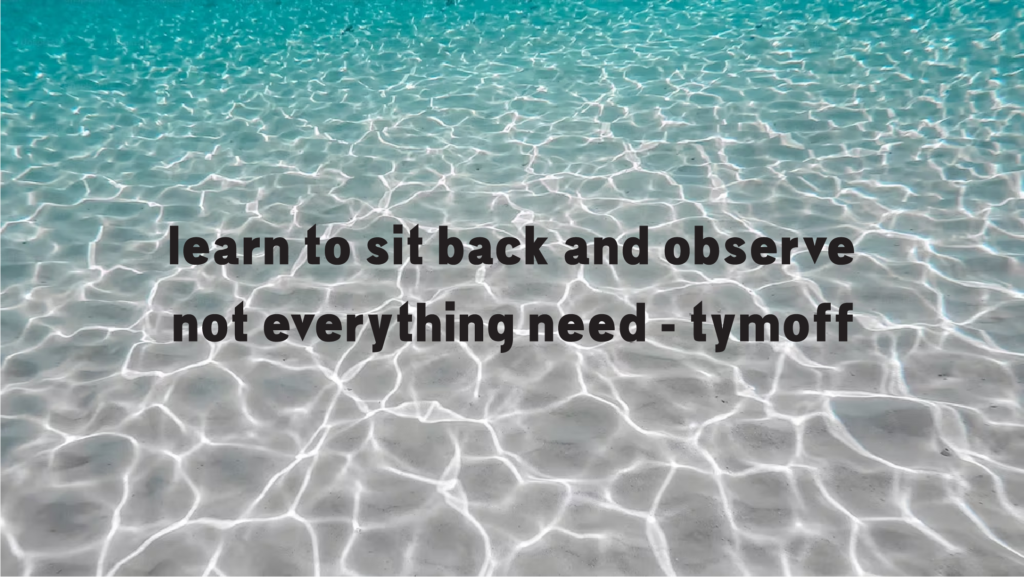Introduction
learn to sit back and observe. not everything need – tymoff ,In a world where hustle culture prevails and constant activity is celebrated, the art of observation often takes a backseat. However, the wisdom of knowing when to sit back and observe can be profoundly transformative. It’s about finding that delicate balance between engaging actively with the world and taking moments of stillness to understand it deeply. By recognizing the value of observation alongside action, individuals can navigate through life with greater clarity, insight, and purpose. This article aims to delve into the significance of observation, exploring its myriad benefits and practical applications, both personally and professionally.
FAQs
Q1: How can I incorporate observation into my daily life?
A: Start by setting aside time each day for quiet reflection and observation. Whether it’s spending a few minutes in nature, journaling about your thoughts and experiences, or simply sitting quietly and observing your surroundings, finding moments of stillness can help you cultivate the practice of observation in your daily life.
Q2: What are some practical tips for improving my observation skills?
A: Practice mindfulness by paying attention to your senses – what do you see, hear, smell, taste, and feel? Notice the details in your environment, from the texture of objects to the colors of the sky. Ask questions and stay curious about the world around you. Engage in active listening when interacting with others, paying attention to their body language and facial expressions.
Q3: How can observation help me in my professional life?
A: Observation is essential for professional growth and development. By paying attention to industry trends, market dynamics, and the actions of your colleagues and competitors, you can gain valuable insights that will help you make more informed decisions and stay ahead of the curve in your career. Observation also helps you develop greater self-awareness and emotional intelligence, which are crucial skills for effective leadership and teamwork.
Q4: What are some common challenges people face when trying to incorporate observation into their lives?
A: One common challenge is the fast-paced nature of modern life, which can make it difficult to find moments of stillness for observation. Additionally, distractions such as technology and busy schedules can make it hard to stay present and focused on observation. Overcoming these challenges requires commitment and practice, but the rewards of cultivating the practice of observation are well worth the effort.
Observation vs. Action
Observation and action are often perceived as opposing forces, but in reality, they are complementary aspects of human experience. While action drives progress and propels us forward, observation serves as the anchor that grounds us in the present moment. Observation is not merely a passive act of watching; it is an active process of gathering insights, understanding patterns, and making informed decisions. By embracing both observation and action, individuals can strike a harmonious balance in their lives. They can navigate challenges with clarity and intention, drawing upon the wisdom gained from observation while propelling themselves forward through purposeful action.
Benefits of Observation
Learn to sit back and observe. not everything need – Tymoff
The benefits of observation extend far beyond mere passive watching. It enhances our awareness, allowing us to see things more clearly and make informed decisions. Through observation, we gain a deeper understanding of ourselves, others, and the world around us. It fosters mindfulness and presence, enabling us to appreciate the richness of each moment. Moreover, observation helps us recognize patterns that might otherwise go unnoticed. Whether in nature, human behavior, or market trends, patterns provide valuable insights that can inform our actions and decisions. By embracing the art of observation, individuals can cultivate a deeper connection with themselves and the world, leading to a more fulfilling and purposeful life.
Recognizing Patterns
One of the most powerful aspects of observation is its ability to reveal patterns in the world around us. Whether in nature, human behavior, or the stock market, patterns abound everywhere we look. By taking the time to observe and recognize these patterns, we can gain valuable insights into how the world works. This, in turn, allows us to make more informed decisions and take proactive steps to achieve our goals. Moreover, recognizing patterns can help us anticipate future events and trends, giving us a strategic advantage in various aspects of our lives. Overall, the ability to recognize patterns is a valuable skill that can lead to greater success and fulfillment.
Understanding Context
Observation also plays a crucial role in helping us understand the context in which events unfold. By observing the world around us, we can gain a deeper understanding of the people, places, and situations we encounter. This, in turn, allows us to make more informed decisions and navigate complex social dynamics more effectively. Moreover, understanding context can help us avoid misunderstandings and misinterpretations by providing a broader perspective on the events and interactions we experience. Overall, the ability to understand context is a valuable skill that can enhance our relationships, improve our communication, and help us navigate the complexities of the modern world more effectively.
Mindfulness and Presence
In today’s fast-paced world, mindfulness and presence have become increasingly important for maintaining mental health and well-being. Observation is a powerful tool for cultivating mindfulness and presence in our lives. By taking the time to observe our thoughts, feelings, and sensations without judgment, we can develop a deeper awareness of ourselves and the world around us. This, in turn, allows us to respond more skillfully to the challenges and stresses of everyday life. Moreover, observation helps us cultivate a sense of presence in the present moment, enabling us to fully engage with our experiences and appreciate the beauty of each passing moment. Overall, the practice of observation is a powerful way to cultivate mindfulness and presence in our lives, leading to greater happiness, fulfillment, and inner peace.
Learning from Others
Observing others is a powerful way to learn and grow. By paying attention to the actions, behaviors, and experiences of those around us, we can gain valuable insights into human nature and social dynamics. This, in turn, allows us to develop greater empathy, understanding, and compassion for others. Moreover, observing others can inspire us to adopt new behaviors, attitudes, and perspectives that can help us become better versions of ourselves. Whether it’s learning from the successes and failures of others or gaining inspiration from their achievements, observing others is a valuable way to expand our knowledge, skills, and understanding of the world.
Applying Observation in Relationships
Observation is particularly important in the context of relationships. By paying attention to the actions, words, and behaviors of our partners, friends, and family members, we can gain valuable insights into their needs, desires, and emotions. This, in turn, allows us to communicate more effectively, resolve conflicts more skillfully, and deepen our connections with others. Moreover, observation helps us develop greater empathy and understanding for the people in our lives, enabling us to cultivate healthier, more fulfilling relationships. Overall, the ability to apply observation in relationships is a valuable skill that can lead to greater intimacy, trust, and connection with others.
Professional Growth
Observation is also essential for professional growth and development. By paying attention to the actions, behaviors, and strategies of our colleagues, competitors, and industry leaders, we can gain valuable insights into best practices, emerging trends, and new opportunities. This, in turn, allows us to adapt more quickly to changing market conditions, make more informed decisions, and stay ahead of the curve in our careers. Moreover, observation helps us develop greater self-awareness and emotional intelligence, enabling us to navigate workplace dynamics more effectively and build stronger, more collaborative teams. Overall, the ability to apply observation in the workplace is a valuable skill that can lead to greater success, satisfaction, and fulfillment in our careers.
Self-Reflection
Observation is a powerful tool for self-reflection and personal growth. By paying attention to our thoughts, feelings, and behaviors without judgment, we can gain valuable insights into our strengths, weaknesses, and areas for improvement. This, in turn, allows us to develop greater self-awareness, resilience, and emotional intelligence. Moreover, observation helps us cultivate a sense of curiosity and wonder about ourselves and the world around us, enabling us to approach life with an open mind and a willingness to learn and grow. Overall, the practice of self-reflection is a valuable way to deepen our understanding of ourselves, improve our relationships, and live more authentically and purposefully.
Finding Inspiration
Observation is also a powerful source of inspiration. By paying attention to the beauty, complexity, and wonder of the world around us, we can gain valuable insights and ideas that can inspire us to create, innovate, and explore new possibilities. Whether it’s finding inspiration in the natural world, in the creativity of others, or in our own experiences and emotions, observation is a powerful way to fuel our imagination and ignite our passion for life. Moreover, observation helps us develop a greater appreciation for the beauty and diversity of the world, enabling us to find joy and inspiration in even the most ordinary moments. Overall, the ability to find inspiration through observation is a valuable skill that can enrich our lives, spark our creativity, and fuel our sense of purpose and fulfillment.
Conclusion
In conclusion, the art of observation is a powerful tool that offers numerous benefits in our personal and professional lives. By learning to sit back and observe, we can gain valuable insights, deepen our understanding of ourselves and the world around us, and navigate through life with greater clarity and intention. From recognizing patterns and understanding context to cultivating mindfulness and finding inspiration, observation enriches every aspect of our lives. By embracing the practice of observation, we can live more authentically, make more informed decisions, and cultivate deeper connections with others. So, let’s take a moment to pause, sit back, and observe the world around us – for in the stillness of observation, we may find the answers we seek.







